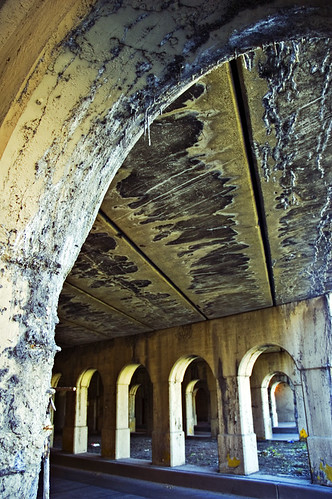For your depressing news of the day:
Things Fall Apart:
Everywhere one looks, the results of decades of public neglect and underinvestment are clear: not only collapsing bridges and exploding steam pipes but traffic-choked streets, clogged ports, corroded drinking-water systems and power brownouts. From 1950 to 1970 the government spent more than 3 percent of GDP on infrastructure. After 1980, that figure dropped by more than a third.Two years ago, following the catastrophic collapse of the levees in New Orleans, which cost more than 1,000 lives, the American Society of Civil Engineers (ASCE) issued a report cataloguing the myriad deficiencies in our nation's infrastructure. That report was followed by a number of other worrying findings. The Transportation Department, for example, estimated that freight bottlenecks were costing the economy $200 billion a year. The Environmental Protection Agency warned of antiquated drinking-water and waste-water systems that would require more than $541 billion a year to rebuild over the next twenty years. And the Federal Highway Administration has calculated that some $141 billion will be needed every year for the next twenty years to repair deficient roads and bridges. All told, the ASCE estimated, the government would need to spend $1.6 trillion over the next five years to repair infrastructure. And that estimate did not address our lagging deployment of high-speed broadband or the major expenditures needed to reduce carbon emissions to stave off climate change.
Those reports, and the tragedy of the New Orleans levee collapse, should have been a wake-up call for our leaders, but little has been done. The Bush Administration has been more interested in protecting its tax cuts for the rich and siphoning off money for its endless occupation of Iraq. And the Democratic Party, scrambling to impress Wall Street with its fiscal conservatism, seems to have forgotten its proud heritage as the party of the New Deal and the Tennessee Valley Authority. Indeed, one of the first acts of the new Democratic Congress was to pass a “pay as you go” budget procedure, a roadblock to new public spending, whether on healthcare or infrastructure.
Technorati Tags: Congress, Democrats, deregulation, Republicans

